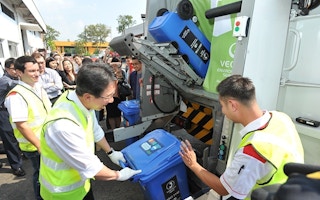Singapore’s Workforce Development Agency (WDA) has launched a new programme to raise the productivity of its waste and recycling management industry, which it hopes will also give a boost to the Republic’s clean technology sector.
The S$5 million Workforce Skills Qualifications (WSQ) programme was unveiled last week at an event held at a recycling facility owned by waste management firm Veolia Environmental Services.
The initiative is jointly developed by WDA, Singapore’s National Environment Agency (NEA) and the Waste Management and Recycling Association of Singapore (WMRAS), an industry association representing 95 of Singapore’s major waste management companies. It will provide skills upgrading and training to about 6,000 workers over the next five years. Courses cost up to S$1,144, but Singaporeans and permanent residents are eligible for course funding of up to 90 per cent.
NEA chief executive Andrew Tan said in a statement the programme would help transform the waste and recycling industry into a key sector of the clean environment cluster through better service standards and higher productivity. “Raising skill levels and professionalism will be a key priority,” he said.
Singapore’s cleantech and environment industries, which include water and waste management and low-emissions energy companies, have grown rapidly in recent years. Last month, the Singapore Business Federation and the Economic Development Board announced a new alliance, the Singapore Sustainability Alliance, which has become one of 30 alliances in the International Cleantech Network (ICN). ICN was set up in 2009 to promote idea sharing and spur investment and research and development (R&D) among the world’s leading clean-technology and sustainability clusters.
WDA’s director for manufacturing and construction, Julia Ng, told Eco-Business that a well-trained workforce is a crucial part of achieving Singapore’s sustainability goals.
“Singapore aims to achieve a target of 60 per cent recycling rate by 2012 in the Singapore Green Plan 2012 and 70 per cent recycling rate by 2030 in the Sustainable Singapore Blueprint. Against this backdrop, the new WSQ Waste Management programme has become a critical part of both workers’ and employers’ value chain so as to achieve this vision,” she added.
The training programme, already underway, involves workers such as waste collection truck drivers, fleet and route coordinators, waste recycling workers, and plant technicians and managers. Training takes place at independent training centres or at in-house training centres at Veolia ES or SembWaste, and workers are taught skills such as operating machinery in this increasingly automated industry.
One example is the Radio-Frequency Identification (RFID) technology being tested in waste collection by Veolia. RFID automatically collects data on volumes of waste collected to allow for more efficient management.
Wong Hong Kuan, WDA’s chief executive, said that WDA wants to convince more Singaporean workers to view the waste management industry as a viable career option. “Through this WSQ Waste Management programme, they can look forward to career advancement with more responsibilities and higher pay,” he said, adding that Singapore would need a highly competent and competitive workforce to cope with increasing amounts of waste.
Last year, Singapore generated about 6.5 million tonnes of waste and recycled 58 per cent of that amount.
The four waste collection companies that collect most of Singapore’s industrial and municipal solid waste, SembWaste, Veolia ES, 800 Super Waste Management and Colex Holdings signed a memorandum of understanding with WDA, NEA, WMRAS and the Building Construction and Timber Industries Employees’ Union (BATU).
The agreement commits the waste companies to training and upgrading their workforce. To encourage the scheme, the NEA has made the provision of the WSQ training a requirement for future waste collection contracts with the NEA.
SembWaste senior vice president Lim Chin Khuang said the WSQ training has improved the efficiency of its staff and provided opportunities for workers to upgrade skills and advance their careers.
“Having a higher skilled workforce will also help to raise the profile of the waste management industry,” he added.








